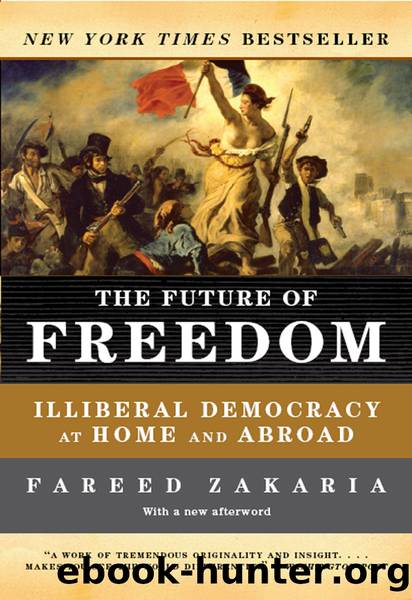The Future of Freedom by Fareed Zakaria

Author:Fareed Zakaria
Language: eng
Format: epub
Publisher: W. W. Norton & Company
Published: 2007-07-14T16:00:00+00:00
The Majestic Clockwork
Spreading democracy is tough. But that does not mean that the West—in particular the United States—should stop trying to assist the forces of liberal democracy. Nor does it imply accepting blindly authoritarian regimes as the least bad alternative. It does, however, suggest a certain sophistication. The haste to press countries into elections over the last decade has been, in many cases, counterproductive. In countries such as Bosnia, which went to the polls within a year of the Dayton peace accords, elections only made more powerful precisely the kinds of ugly ethnic forces that have made it more difficult to build genuine liberal democracy there. The ethnic thugs stayed in power, kept the courts packed and the police well fed. The old system has stayed in place, delaying real change for years, perhaps decades. In East Timor and Afghanistan, a longer period of state-building has proved useful. In general, a five-year period of transition, political reform, and institutional development should precede national multiparty elections. In a country with strong regional, ethnic, or religious divisions—like Iraq—this is crucial. It ensures that elections are held after civic institutions, courts, political parties, and the economy have all begun to function. As with everything in life, timing matters.
Although it is easy to impose elections on a country, it is more difficult to push constitutional liberalism on a society. The process of genuine liberalization and democratization, in which an election is only one step, is gradual and long-term. Recognizing this, governments and nongovernmental organizations are increasingly promoting a wide array of measures designed to bolster constitutional liberalism in developing countries. The National Endowment for Democracy promotes free markets, independent labor movements, and political parties. The U.S. Agency for International Development funds independent judiciaries. In the end, however, elections trump everything. If a country holds elections, Washington and the world will tolerate a great deal from the resulting government, as they did with Russia’s Boris Yeltsin, Kyrgystan’s Askar Akayev, and Argentina’s Carlos Menem. In an age of images and symbols, elections are easy to capture on film. But how do you televise the rule of law? Yet there is life after elections, especially for the people who live there.
Conversely, the absence of free and fair elections should be viewed as one flaw, not the definition of tyranny. Elections are an important virtue of governance, but they are not the only virtue. It is more important that governments be judged by yardsticks related to constitutional liberalism. Economic, civil, and religious liberties are at the core of human autonomy and dignity. If a government with limited democracy steadily expands these freedoms, it should not be branded a dictatorship. Despite the limited political choice they offer, countries such as Singapore, Malaysia, Jordan, and Morocco provide a better environment for the life, liberty, and happiness of their citizens than do the dictatorships in Iraq and Libya or the illiberal democracies of Venezuela, Russia, or Ghana. And the pressures of global capitalism can push the process of liberalization forward as they have in China.
Download
This site does not store any files on its server. We only index and link to content provided by other sites. Please contact the content providers to delete copyright contents if any and email us, we'll remove relevant links or contents immediately.
| Anarchism | Communism & Socialism |
| Conservatism & Liberalism | Democracy |
| Fascism | Libertarianism |
| Nationalism | Radicalism |
| Utopian |
The Secret History by Donna Tartt(16606)
The Social Justice Warrior Handbook by Lisa De Pasquale(11485)
Thirteen Reasons Why by Jay Asher(7780)
This Is How You Lose Her by Junot Diaz(5753)
Weapons of Math Destruction by Cathy O'Neil(5029)
Zero to One by Peter Thiel(4816)
The Myth of the Strong Leader by Archie Brown(4785)
Promise Me, Dad by Joe Biden(4440)
Stone's Rules by Roger Stone(4412)
Beartown by Fredrik Backman(4403)
How Democracies Die by Steven Levitsky & Daniel Ziblatt(4392)
The Fire Next Time by James Baldwin(4336)
100 Deadly Skills by Clint Emerson(4070)
A Higher Loyalty: Truth, Lies, and Leadership by James Comey(4024)
Rise and Kill First by Ronen Bergman(4008)
The David Icke Guide to the Global Conspiracy (and how to end it) by David Icke(3875)
The Farm by Tom Rob Smith(3869)
Secrecy World by Jake Bernstein(3773)
The Doomsday Machine by Daniel Ellsberg(3725)
